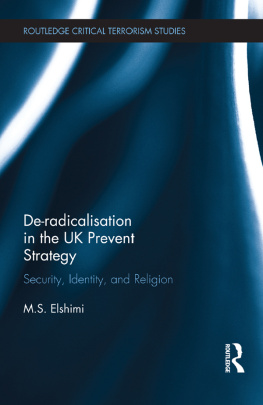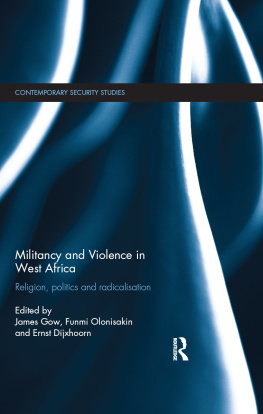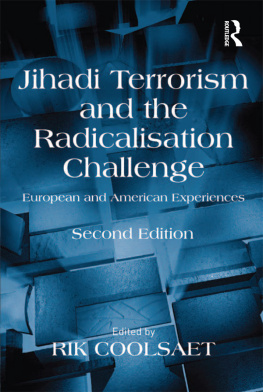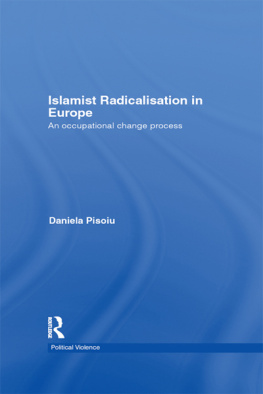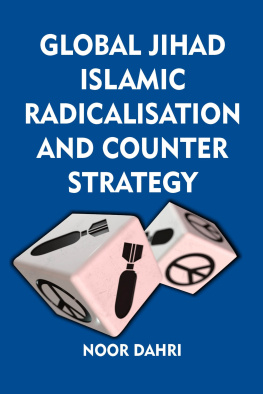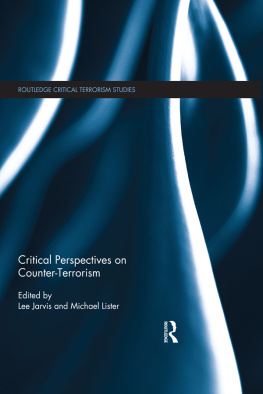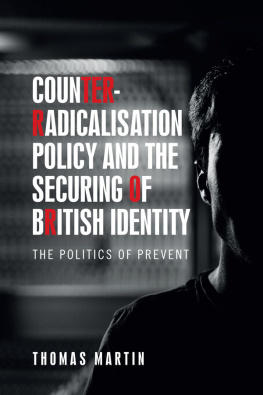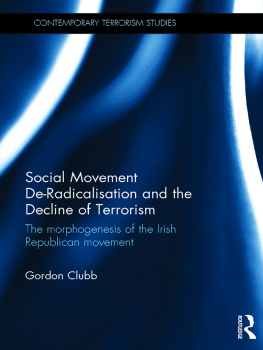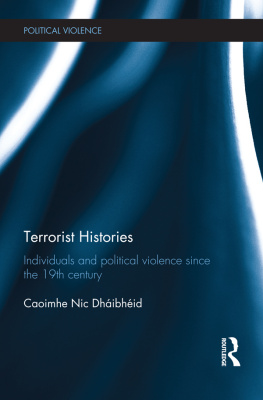This book is an essential resource for researchers, policymakers and activists challenged with the task of understanding the processes of radicalisation and de-radicalisation in the British context and beyond. It questions the viability of the Prevent programme, providing a nuanced, detailed and insightful account of what works or not in the context of both the concept and in the delivery of countering violent extremism programming. It facilitates a grounded social science understanding to help resolve a significant multi-faceted and multi-layered concern facing liberal democracies today and in the near future. This remarkable, brave and profound book is an indispensable intellectual contribution.
Tahir Abbas, Royal United Services Institute, UK
Elshimis book represents the next step in research on (de)radicalisation, and should be essential reading for anyone who has an interest in this field. The examination of the Prevent policy in De-Radicalisation in the UK Prevent Strategy provides welcome clarity and insight in to whats happening on the ground, policy development, and a frank and useful assessment of political discourse that marks a new and refreshing point of departure for this subject.
Jonathan Githens-Mazer, University of Exeter, UK
De-radicalisation in the UK Prevent
Strategy
This book examines de-radicalisation policy in the UK and addresses the contradictions evident in the conceptualisation and practice of de-radicalisation.
It explores three main themes that touch upon some of the most pressing issues of our day: security, identity and religion. Situated within the Prevent strand of the UK Counter-Terrorism policy and administered by the police through the Channel Programme, policymakers have promoted de-radicalisation as a vital instrument in the fight against terrorism. Despite the political and legal importance of de-radicalisation as an instrument of counter-terrorism, we continue to know very little about the programme and the profile of individuals who have been de-radicalised, as well as having little or no access to data on the programme. There is also a glaring lacuna in the wider literature regarding the concept, theory, and evidence base for de-radicalisation policies. This book addresses this lacuna and, with the use of data collected from interviews conducted with 27 practitioners, this work reveals the existence of multiple conceptions of de-radicalisation and a number of conceptual features unique to the UK context. Subsequently, the book proposes that de-radicalisation in the UK would be best conceptualised as technologies of the self. Seen in this way, de-radicalisation is less about tackling terrorism and radicalisation and more about the re-configuring of citizenship, the construction of a mainstream British identity, and the promotion of certain subjectivities in an era of uncertainty about British political identity.
This book will be of much interest to students of critical terrorism studies, de-radicalisation, counter-terrorism, UK politics and security studies in general.
M. S. Elshimi is a Research Analyst at the Royal United Services Institute specialising in Countering Violent Extremism. He has a PhD in Ethno-Political Studies from Exeter University, UK.
Series: Routledge Critical Terrorism Studies
Series Editor: Richard Jackson
University of Otago, New Zealand
This book series will publish rigorous and innovative studies on all aspects of terrorism, counter-terrorism and state terror. It seeks to advance a new generation of thinking on traditional subjects and investigate topics frequently overlooked in orthodox accounts of terrorism. Books in this series will typically adopt approaches informed by critical-normative theory, post-positivist methodologies and non-Western perspectives, as well as rigorous and reflective orthodox terrorism studies.
Counter-Terrorism and State Political Violence
The War on Terror as terror
Edited by Scott Poynting and David Whyte
Selling the War on Terror
Foreign policy discourses after 9/11
Jack Holland
The Making of Terrorism in Pakistan
Historical and social roots of extremism
Eamon Murphy
Lessons and Legacies of the War on Terror
From moral panic to permanent war
Edited by Gershon Shafir, Everard Meade, and William J. Aceves
Arguing Counterterrorism
New perspectives
Edited by Daniela Pisoiu
States of War since 9/11
Terrorism, sovereignty and the war on terror
Edited by Alex Houen
Counter-Radicalisation
Critical perspectives
Edited by Charlotte Heath-Kelly, Lee Jarvis and Christopher Baker-Beall
Critical Perspectives on Counter-Terrorism
Edited by Lee Jarvis and Michael Lister
Researching Terrorism, Peace and Conflict Studies
Interaction, synthesis, and opposition
Edited by Ioannis Tellidis and Harmonie Toros
Hamas, Jihad and Popular Legitimacy
Reinterpreting resistance in Palestine
Tristan Dunning
Russias Securitization of Chechnya
How war became acceptable
Julie Wilhelmsen
Ending ETAs Armed Campaign
How and why the Basque armed group abandoned violence
Imanol Murua
De-radicalisation in the UK Prevent Strategy
Security, identity, and religion
M.S. Elshimi
First published 2017
by Routledge
2 Park Square, Milton Park, Abingdon, Oxon OX14 4RN
and by Routledge
711 Third Avenue, New York, NY 10017
Routledge is an imprint of the Taylor & Francis Group, an informa business
2017 M.S. Elshimi
The right of M.S. Elshimi to be identified as author of this work has been asserted by him in accordance with sections 77 and 78 of the Copyright, Designs and Patents Act 1988.
All rights reserved. No part of this book may be reprinted or reproduced or utilised in any form or by any electronic, mechanical, or other means, now known or hereafter invented, including photocopying and recording, or in any information storage or retrieval system, without permission in writing from the publishers.
Trademark notice: Product or corporate names may be trademarks or registered trademarks, and are used only for identification and explanation without intent to infringe.
British Library Cataloguing in Publication Data
A catalogue record for this book is available from the British Library
Library of Congress Cataloging in Publication Data
Names: Elshimi, M. S., author.
Title: De-radicalisation in the UK prevent strategy : security, identity, and religion / M.S. Elshimi.
Other titles: De-radicalization in the UK prevent strategy
Description: Abingdon, Oxon ; New York, NY : Routledge, 2017.
Series: Routledge critical terrorism studies | Includes bibliographical references and index.
Identifiers: LCCN 2016043231 | ISBN 9781138281042 (hardback)
ISBN 9781315271361 (ebook)
Subjects: LCSH: TerrorismPreventionGovernment policyGreat Britain. | TerrorismPreventionSocial aspectsGreat Britain. | Internal securityGreat Britain. | RadicalismGreat Britain. | Islamic fundamentalismGreat Britain.

